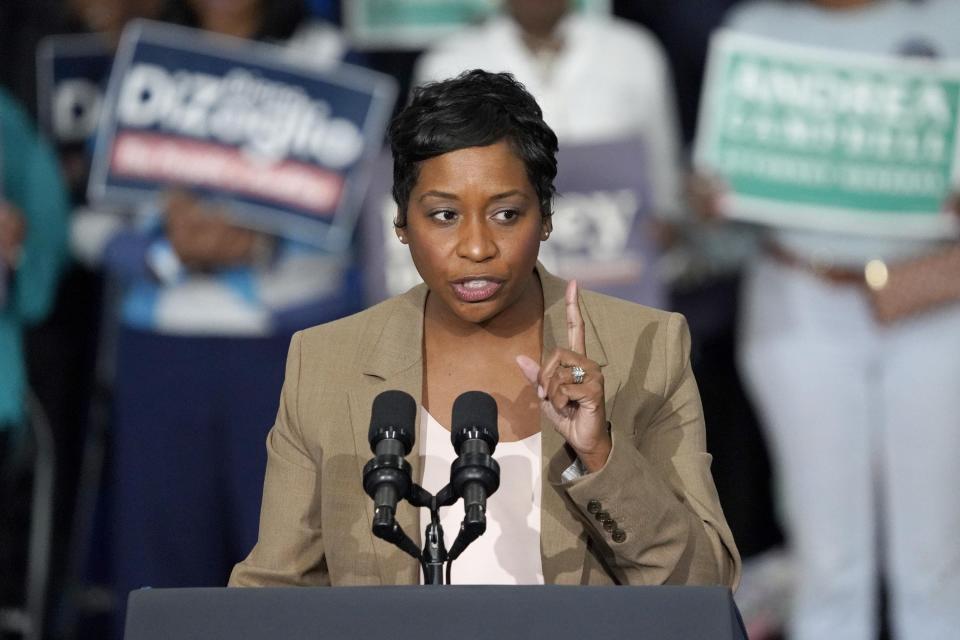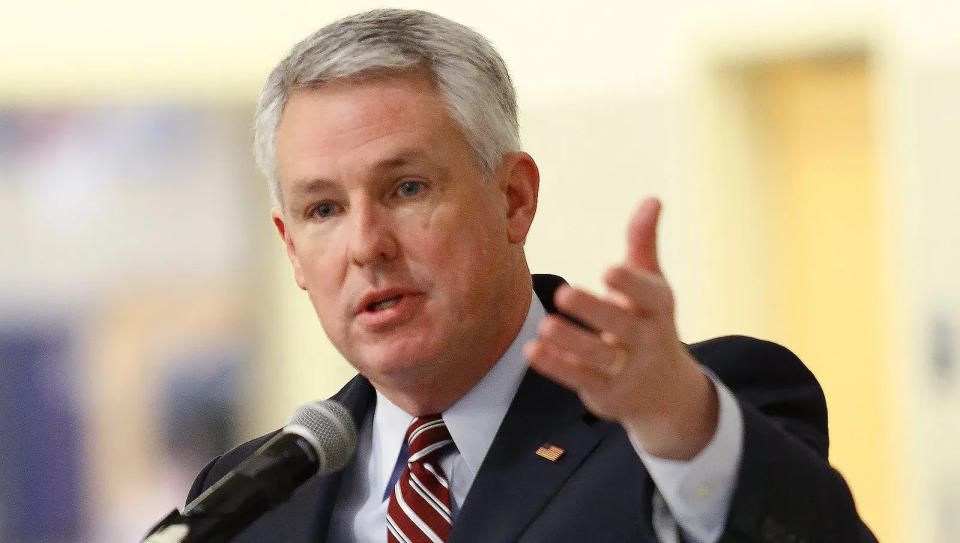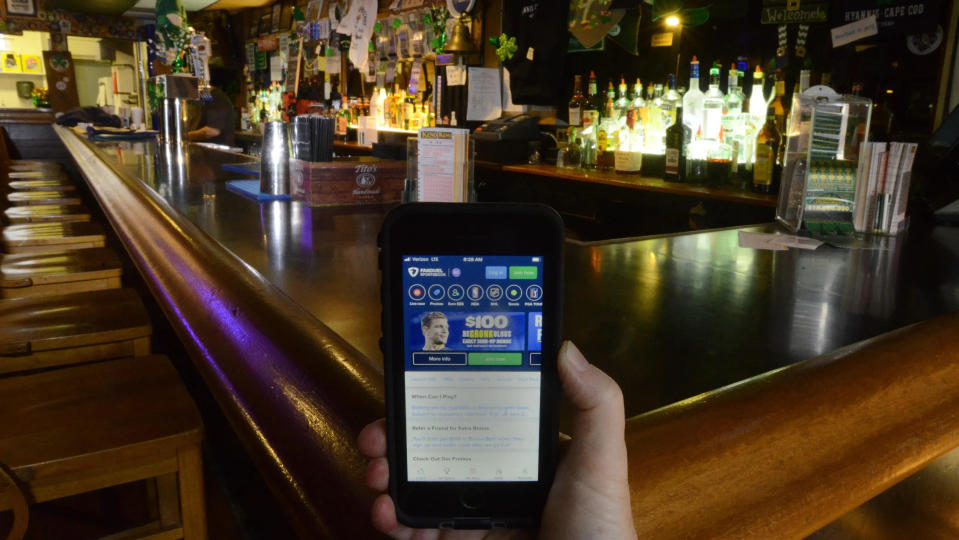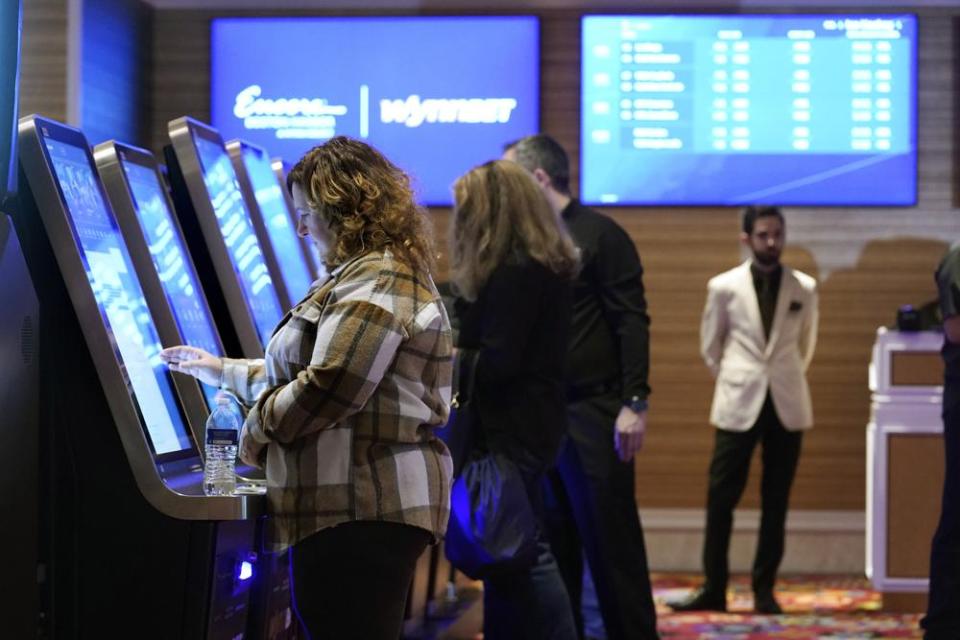Mass. gaming panel OKs more stringent ad policies for sports betting. Is it enough?
BOSTON — In response to recent proposals from Attorney General Andrea Campbell, the Massachusetts Gaming Commission has voted to add new rules and incorporate language changes to its advertising regulations.
Last month, the Attorney General's Office submitted a letter to the commission about limiting the advertising of online sports wagering to protect young people. It recommended that the commission limit advertising on social media and connected television; prohibit app designs from encouraging risky behavior; and restrict operators from improperly targeting users through digital advertising or push alerts.
“While my office supports the sports betting law, we are acutely aware that its rollout to the mass market through digital platforms — if not done thoughtfully — can have addicting and devastating effects,” Campbell said in an email response to a media inquiry. “My office is committed to holding operators to the highest standard of safety and responsibility; where we find unfair conduct or business practices, we will not hesitate to take action to ensure that consumers are protected.”

The AG's Office proposed that the commission require sports wagering operators to disclose the roles of automated decision-making and algorithms, ban certain promotional offers, allow customers to opt out of information-sharing and push alerts and prohibit conflict of interest between operators and spokespersons. The letter also suggested reiterating that operators comply with all state and federal laws, including consumer protection and data security regulations.
Thomas Mills, the Gaming Commission’s communications director, said in an interview that one new rule the commission has already approved is clarifying affiliate marketing regulations, which involves companies paying content websites and publishers to promote their products.
'Retail gambling': Legal online betting kicks off in Massachusetts, ahead of March Madness
“It will allow companies to partner with marketers on what's known as cost-per-acquisition, but would not allow them to partner and provide those individuals with revenue based on how much someone gambles,” Mills said, adding that the new rule will come into play on April 14 given Secretary of the Commonwealth posting schedules.
Mills said current regulations have “strong provisions in place” to ensure people who are under 21 are not gambling.
“You have to enter a casino through an ID check, and you will not be able to enter if you are under 21,” he said. “And for sports wagering applications and websites, there are identity checks that folks have to go through where you have to give your date of birth and the last four digits of your Social Security number.”
Immediate interest: More than 400,000 accounts set up in first days of Mass. online sports betting
Mills added that the regulations also prohibit sports wagering ads through outlets where 25% of the audience is under the age of 21, as well as advertising on college campuses.
Some say regulations for sports betting ads don't go far enough
However, some say the regulations aren’t enough. State Sen. John Keenan, D-Quincy, said rules for other addictive products, such as cannabis, are much more stringent than the standard for gambling advertisements.
“Particularly when it comes to young people on the cannabis side, they can't advertise in a forum, or to an outlet or any place with the expected audience is going to be more than 50% of people under the age of 21,” Keenan said. “That same standard was not applied to sports betting.”

Keenan said advertisements, such as a banner saying "Bet $5 to win $150 in bonus bet" on DraftKings’ website, are "unfair and deceptive" because they're designed to convince people of low risks associated with betting.
“The industry is looking to bring as many people as possible into sports betting, and so they're trying to make that access point to that entry into sports betting as a low barrier as easy as possible,” Keenan said. “The money that's at stake is so great, so the less stringent the advertising restrictions, the more advertising they can do the broader base the market becomes.”
Where to get help: For some, legal sports betting will lead to gambling addiction
According to DraftKings, the company includes a responsible gaming message and a link to a site that provides information about responsible gaming and its services. DraftKings also says it complies with customer requests to not receive promotional material; uses data analytics to identify and intervene in potentially problematic play; and has a team dedicated to reviewing account activity for signs of potential harm.
“DraftKings takes a systems-based approach to responsible gaming, which includes the ongoing optimization of our technology, detection and intervention processes, as well as looking at the gaming environment as a whole and collaborating externally with scientific experts, advocacy groups, operators or other parties to spur innovation in safe play,” wrote Chrissy Thurmond, senior director of responsible gaming at DraftKings.

Keenan said there has been a surge in sports betting ads since January, appearing on various platforms such as social media, TV commercials and public radio. He said many people have expressed fatigue toward these ads.
“Television shows themselves are devoted to advertising gambling like baseball has the ‘Pregame Spread,’” said Harry Levant, a public health advocate and addict in recovery with the nonprofit Stop Predatory Gambling.
'Diagnostic criteria for a gambling disorder'
Levant said regulations should put restrictions on the timing of gambling ads on radio and TV.
“Someone remaining in action is part of the diagnostic criteria for a gambling disorder when you continue to chase more action or chase your losses,” he said, adding that he believes the advertisements are designed to keep people engaged in the product.
Les Bernal, national director of Stop Predatory Gambling, said the government should treat gambling advertising and marketing the same as those for other addictive products.
'Public health approach': Launch of online betting creates bigger push to address gambling addiction
“We're not allowing dangerous and addictive products like tobacco to be marketed in the middle of TV broadcasts for sports,” he said. “The same restrictions that exist for tobacco sales in Massachusetts must exist for commercialized gambling, both online gambling and for the casinos and the state lottery as well.”
Bernal added the prevalence of sports betting ads is “unleashing an epidemic of child gambling” across the state because it normalizes betting activity.
“When kids see all these ads, it desensitizes them to the dangers of commercialized gambling,” Bernal said. “And that's an incredibly serious problem and it leads to serious addiction amongst kids, young teens or teenagers or college-age students because if you start gambling as a young person, you're likely to become a gambling addict when you get older.”

Mills said the Gaming Commission has a public health trust fund that is committed to providing the public with tools to help control their gaming, including the Voluntary Self-Exclusion program for casinos and sports wagering; the PlayMyWay budgeting tool on every slot machine in the state; and GameSense advisers who are available at each casino in the state as well as online or over the phone.
According to the Gaming Commission, more than 40 people have joined the sports wagering Voluntary Self-Exclusion program since its launch in January, bringing the total number of enrollees to about 1,350. Additionally, GameSense advisers currently have an average of 5,748 interactions with patrons, a 50% increase over 2022, and 155 interactions online or by phone, a 39% jump from a year ago.
“It gives the appearance that the state is doing something to help the tens of thousands of families that are harmed irreparably from this dangerous and addictive product,” Bernal commented on the trust fund.
Bill proposes ban on deceptive terms in ads
Keenan proposed a bill in January about preventing the gambling industry from using deceptive terms like "bonus promotions," "same-game parlays," "odds boosts," "risk-free: or "no-sweat." The bill has been referred to the Legislature’s Committee on Consumer Protection and Professional Licensure.
“We think that this bill sends a clear message, one by prohibiting the type of ads you're doing, and then the broader message that we're going to continue to make sure that you're not targeting any one group, specifically young people, and that you're not being unfair or deceptive in your advertising,” Keenan said.
Mills said the commission has already “taken a lot of steps” to ban the use of misleading terms like “risk-free” in gambling advertising and promotional activities. The American Gaming Association released updates on March 27 to add the rule banning all use of “risk-free” in advertising in its marketing code.
“While we do have broad authority, we are limited by things like the Constitution and the First Amendment,” Mills said. “I think there needs to be a healthy balance with companies promoting their products but also doing so responsibly, complying with our regulations and not promoting irresponsible behavior.”
This article originally appeared on The Milford Daily News: Mass. lawmakers seek more stringent ad standards for sports betting

